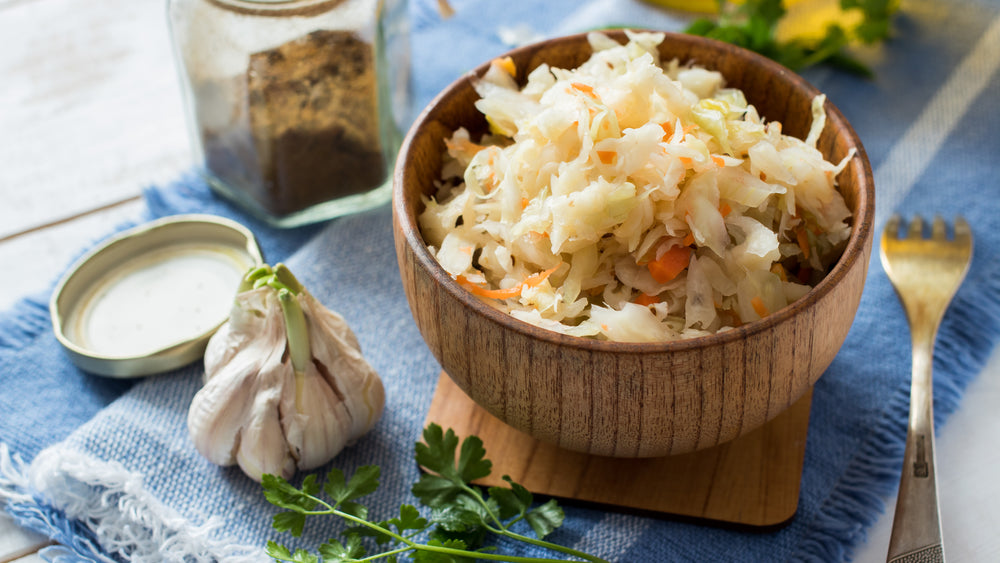5 aliments bénéfiques pour l'intestin à inclure dans votre routine quotidienne

Le vieil adage « On est ce que l'on mange » est on ne peut plus vrai en matière de santé intestinale. Il a été difficile de limiter ma sélection à cinq aliments, mais en tant que nutritionniste holistique, voici quelques-uns des aliments les plus courants que je recommande à mes clients qui souhaitent une santé intestinale optimale.
Le collagène devrait faire partie de votre routine quotidienne pour de nombreuses raisons. En effet, c'est la protéine la plus abondante dans l'organisme, et sa quantité commence à diminuer dès la vingtaine. Du point de vue intestinal, des recherches ont montré que le collagène oral peut agir comme un prébiotique, prévenant les perturbations du microbiome intestinal, ou dysbiose, et réduisant ainsi l'inflammation générale.
Deux des acides aminés vedettes présents dans le collagène sont la glycine et la glutamine, qui aident tous deux à reconstruire les muscles, contribuant ainsi à réparer les fuites intestinales et le syndrome du côlon irritable.
Le collagène est non seulement bon pour vos intestins, mais vous constaterez également des bienfaits pour vos cheveux, votre peau et vos ongles en l'intégrant à votre routine quotidienne. Mon collagène préféré est le nouveau collagène pur de Genuine Health. On le trouve sous forme de collagène bovin issu de vaches nourries à l'herbe et de collagène marin issu de poissons sauvages de l'Atlantique Nord. Si vous hésitez, sachez qu'il n'y a aucune différence d'efficacité ou d'absorption entre le collagène marin et le collagène bovin ; choisissez donc celui que vous préférez !
Si cet aliment acide figure sur cette liste, c'est parce qu'il est fermenté. Ce processus crée des bactéries bénéfiques dans l'aliment. Au niveau intestinal, ces bactéries bénéfiques peuvent réduire l'inflammation , améliorer l'absorption des nutriments et même atténuer, voire prévenir, les symptômes d'allergies alimentaires comme l'intolérance au lactose.
Si la choucroute n'est pas votre tasse de thé, vous pouvez inclure d'autres aliments fermentés, comme le kimchi et le kéfir. Je recommande également d'intégrer un probiotique quotidien à votre alimentation pour augmenter le nombre de bonnes bactéries intestinales.
Les graines de citrouille sont une excellente source de zinc. Un quart de tasse de graines de citrouille suffit à couvrir près d'un quart de l'apport quotidien recommandé. Concernant la digestion, il existe un lien entre la quantité d'enzymes digestives présentes dans le pancréas et le taux de zinc. Les enzymes digestives sont essentielles à la digestion des aliments, et une mauvaise digestion peut provoquer une inflammation intestinale. La viande rouge, les huîtres et les noix de cajou sont d'autres sources de zinc.
Le saumon figure sur cette liste pour sa teneur en acides gras oméga-3. De nombreuses maladies auto-immunes, comme la thyroïdite de Hashimoto, la polyarthrite rhumatoïde et la rectocolite hémorragique, peuvent être liées à une inflammation intestinale. Les oméga-3 exercent un effet anti-inflammatoire et agissent comme prébiotiques , modulant le milieu intestinal. De plus, les personnes souffrant de troubles intestinaux chroniques, comme les maladies inflammatoires chroniques de l'intestin, ont tendance à avoir des taux d'oméga-3 plus faibles .
Il n'est pas nécessaire de consommer du saumon quotidiennement ; deux à trois fois par semaine sont idéales. Un complément d' huile de poisson est un excellent complément au saumon deux fois par semaine.
Les graines de lin sont une excellente source de fibres, et quand on parle de bien-être intestinal, il est essentiel de mentionner les fibres ! Les principaux bienfaits des graines de lin sont obtenus lorsqu'elles sont fraîchement moulues. Autrement, elles traversent l'organisme sans être digérées. Les bonnes graisses qu'elles contiennent sont également sensibles à la lumière, à la chaleur et à l'air. Si vous les moulez à l'avance ou si vous les achetez déjà moulues, veillez à les conserver au congélateur.
Les fibres des graines de lin fermentent dans l'intestin et gonflent les selles, favorisant ainsi un transit intestinal plus régulier. De plus, les fibres vous rassasient plus longtemps, contribuant ainsi à réguler votre glycémie et vos envies de grignoter !
Collagène
Le collagène devrait faire partie de votre routine quotidienne pour de nombreuses raisons. En effet, c'est la protéine la plus abondante dans l'organisme, et sa quantité commence à diminuer dès la vingtaine. Du point de vue intestinal, des recherches ont montré que le collagène oral peut agir comme un prébiotique, prévenant les perturbations du microbiome intestinal, ou dysbiose, et réduisant ainsi l'inflammation générale.
Deux des acides aminés vedettes présents dans le collagène sont la glycine et la glutamine, qui aident tous deux à reconstruire les muscles, contribuant ainsi à réparer les fuites intestinales et le syndrome du côlon irritable.
Le collagène est non seulement bon pour vos intestins, mais vous constaterez également des bienfaits pour vos cheveux, votre peau et vos ongles en l'intégrant à votre routine quotidienne. Mon collagène préféré est le nouveau collagène pur de Genuine Health. On le trouve sous forme de collagène bovin issu de vaches nourries à l'herbe et de collagène marin issu de poissons sauvages de l'Atlantique Nord. Si vous hésitez, sachez qu'il n'y a aucune différence d'efficacité ou d'absorption entre le collagène marin et le collagène bovin ; choisissez donc celui que vous préférez !
Choucroute
Si cet aliment acide figure sur cette liste, c'est parce qu'il est fermenté. Ce processus crée des bactéries bénéfiques dans l'aliment. Au niveau intestinal, ces bactéries bénéfiques peuvent réduire l'inflammation , améliorer l'absorption des nutriments et même atténuer, voire prévenir, les symptômes d'allergies alimentaires comme l'intolérance au lactose.
Si la choucroute n'est pas votre tasse de thé, vous pouvez inclure d'autres aliments fermentés, comme le kimchi et le kéfir. Je recommande également d'intégrer un probiotique quotidien à votre alimentation pour augmenter le nombre de bonnes bactéries intestinales.
Graines de citrouille
Les graines de citrouille sont une excellente source de zinc. Un quart de tasse de graines de citrouille suffit à couvrir près d'un quart de l'apport quotidien recommandé. Concernant la digestion, il existe un lien entre la quantité d'enzymes digestives présentes dans le pancréas et le taux de zinc. Les enzymes digestives sont essentielles à la digestion des aliments, et une mauvaise digestion peut provoquer une inflammation intestinale. La viande rouge, les huîtres et les noix de cajou sont d'autres sources de zinc.
Saumon
Le saumon figure sur cette liste pour sa teneur en acides gras oméga-3. De nombreuses maladies auto-immunes, comme la thyroïdite de Hashimoto, la polyarthrite rhumatoïde et la rectocolite hémorragique, peuvent être liées à une inflammation intestinale. Les oméga-3 exercent un effet anti-inflammatoire et agissent comme prébiotiques , modulant le milieu intestinal. De plus, les personnes souffrant de troubles intestinaux chroniques, comme les maladies inflammatoires chroniques de l'intestin, ont tendance à avoir des taux d'oméga-3 plus faibles .
Il n'est pas nécessaire de consommer du saumon quotidiennement ; deux à trois fois par semaine sont idéales. Un complément d' huile de poisson est un excellent complément au saumon deux fois par semaine.
Graines de lin moulues
Les graines de lin sont une excellente source de fibres, et quand on parle de bien-être intestinal, il est essentiel de mentionner les fibres ! Les principaux bienfaits des graines de lin sont obtenus lorsqu'elles sont fraîchement moulues. Autrement, elles traversent l'organisme sans être digérées. Les bonnes graisses qu'elles contiennent sont également sensibles à la lumière, à la chaleur et à l'air. Si vous les moulez à l'avance ou si vous les achetez déjà moulues, veillez à les conserver au congélateur.
Les fibres des graines de lin fermentent dans l'intestin et gonflent les selles, favorisant ainsi un transit intestinal plus régulier. De plus, les fibres vous rassasient plus longtemps, contribuant ainsi à réguler votre glycémie et vos envies de grignoter !

















































